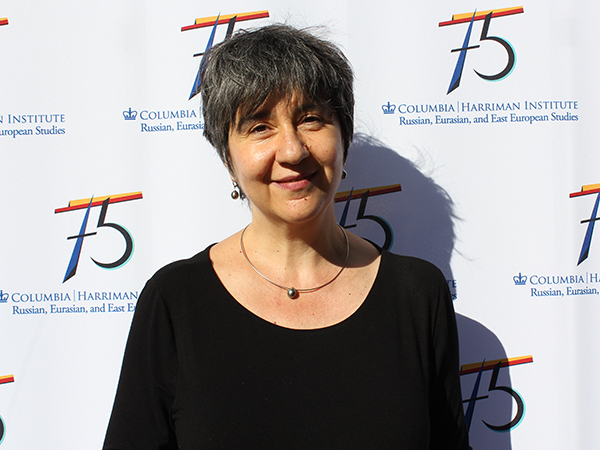Valentina Izmirlieva assumed her new role as director of the Harriman Institute on January 1, 2022. A longstanding member of the Harriman community, she has been a faculty member at the Slavic Department since 1999. Her teaching ranges from Russian literature and culture, medieval literature of the Eastern Slavs and the history of religion in Russia from Prince Vladimir to Vladimir Putin, to critical theory, gender studies, Slavic modernism, and Balkan cultural politics.
As a scholar, she has always aspired to expand the purview of her field beyond the Cold War logic that so often defines it. “All these places that are so culturally different— Central Europe, the Balkans, the Caucasus, Central Asia—are lumped in together with the Soviet Union and Russia, which provides only one context for understanding their distinctive histories,” she says, noting that she has devoted her entire career to researching other relevant contexts.
Currently, Professor Izmirlieva is finishing a book about the Balkan Christian hajjis of the Ottoman Empire and their role for building Slavic national elites. This unique—and virtually unstudied—group of Eastern Orthodox pilgrims to Jerusalem modeled their journey on the Muslim Hajj to Mecca. In the process, they transformed the old Christian tradition of devotional travels into a new tool for social mobility.
Her first book, All the Names of The Lord: Lists, Mysticism and Magic (University of Chicago, 2008) explores cross-religious exchange in the Slavic world from a different perspective. It examines traces of the Jewish mystical tradition in Christian texts across medieval and early modern Europe. It was praised as “an exemplary achievement” (Slavic and East European Journal), “a scholarly tour de force” (Canadian Slavonic Papers), and both “an intellectual adventure” [and] “a literary treat” (F. E. Peters, New York University).
Professor Izmirlieva’s ongoing project, Black Sea Networks, is a ground-breaking global initiative anchored in the Black Sea as a hub of cultural, political, and historical interest. The new framework it proposes aims to reorient Slavic studies from a shared Slavic identity imagined as homogenous toward shared spaces, where Slavs and non-Slavs are bound together by durable links of conflict and competition, cooperation and creative compromise. “Shared lands are heavily contested, which makes land-based studies ideologically fraught,” she says. “Focusing on the sea de-centers the Slavic field in a way that reveals new heuristic advantages.” In 2016, the initiative won a two-year grant from the President’s Global Innovation Fund at Columbia.
Former Harriman director Alexander Cooley, who serves on the Black Sea Networks advisory board, commends Professor Izmirlieva for her ability to bring together diverse communities of scholars and institutional partners. “It is one thing to embrace diversity and interdisciplinarity in theory, but far more challenging to effectively promote, as Valentina has, new opportunities for local interactions, communications, and mutual learning,” he says.
Congratulations to Professor Valentina Izmirlieva on her new role!


